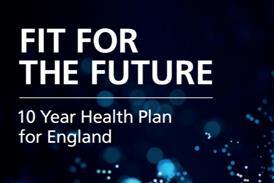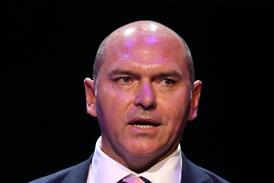A Labour government would use pay restraint and make “difficult choices” about the wages of NHS frontline staff if the party wins the election next year, Andy Burnham has said.
The shadow health secretary told HSJ he wanted a deal for staff that was “right and fair” and which reflected rises in living costs and other pressures, such as increases in professional fees for nurses.
He said he accepted there was “always a trade-off between what you can pay and job numbers”.
Asked if he would use pay restraint to address the health service’s long term financial challenges, he said: “Of course.”

“I think it’s going to be an on going reality that there is going to have to be difficult choices about pay.
“There’s no getting away from that. Everyone understands that,” he said
He added: “There is always a trade-off between what you can pay and job numbers.
“Also, there needs to be a further discussion about hours and working conditions.
“But it needs to be done in a context of social partnership, where you have those discussions openly between NHS employers and the trade unions. That clearly has been abandoned in recent times.”
Mr Burnham said the independent NHS Pay Review Body was “very important [and] worked for both sides”.
He described the coalition government’s decision to reject its recommendation this year for a 1 per cent pay rise as “a bad one”.
“We have made commitments on staff numbers because I don’t think you can get away from it. We’re running on empty in places at the moment.
“Equally [NHS England chief executive] Simon Stevens was right to say that you can’t have pay freezes forever because morale is a big problem and it’s a big threat,” he said.
In a wide ranging interview, Mr Burnham also set out in his “preferred provider” policy, a potential radical shake-up of drug access rules, and how health and wellbeing boards would work with clinical commissioning groups.
Andy Burnham on:
Personal budgets
“My instincts tell me this is an area to tread with caution,” Mr Burnham told HSJ. “Personal budgets in social care are not the same as personal budgets in health care.
“My main reflection would be that personal budgets are not the only route to personalisation. Personalisation is definitely a good thing.”
“The problem with personal budgets in my view – and I’m not saying they don’t have a role, they may have a role – is that they’re an opt out mechanism, aren’t they?
“My route to personalisation will be more about giving people the right to a single point of contact, the right to a personalised plan, [and] stronger rights to how and where care is delivered.
“I think you can achieve personalisation in a much less risky way if you try and personalise in the mainstream system.”
The cancer drugs fund
“We’re looking at options for that,” the shadow health secretary said: “The first thing to say is that we are looking for a broader focus.
“The problem with it [the cancer drugs fund] is that it’s good politics but bad policy in that there is a debate about whether cancer can and should be separated from other conditions.
“The first point of differentiation comes there.
“The second is to prioritise drugs over other forms of cancer treatment, over chemotherapy, over radiotherapy.
“That is where the cancer drugs fund has kind of got into trouble.”
“As a first step, I have taken the decision that the current focus of the cancer drugs fund is too narrow.
“We are looking at it but, to be honest, we’ve not got an absolute firm and detailed policy.”
Exclusive: Labour could make NICE guidance mandatory
- 1
- 2
- 3
- 4
- 5
 Currently reading
Currently reading'There's no getting away from difficult choices over staff pay,' says Burnham































4 Readers' comments